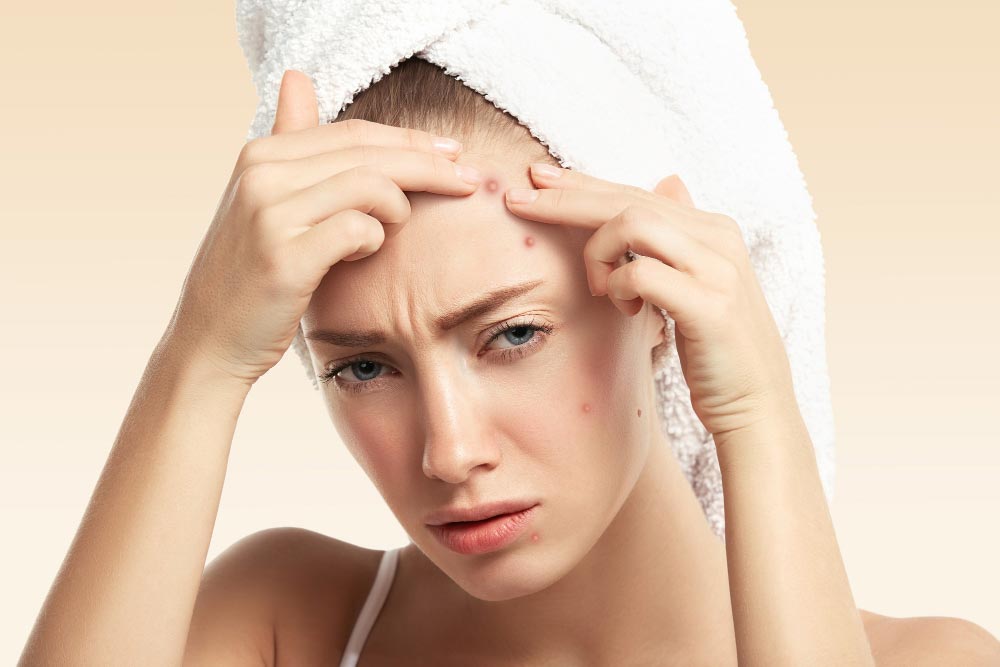Table of Contents
Acne, or acne vulgaris, to be specific, is a common skin problem that most people are already aware of.
It is dreaded by all and happens mostly to many of us by the time we reach adolescence. It is as common an issue yet causes great distress and shame for most people. Although it is a transitory affliction on our skin, it can leave lifelong scars that affect us for the rest of our lives, necessitating a better understanding of it.
Acne is caused by blocked hair follicles beneath our skin. The oil that maintains our skin from drying out, when mixed with dead skin cells, can clog our pores, resulting in pimple outbreaks. The most common sites for these outbreaks are our faces, necks, backs, chests, and shoulders.
Now, let’s delve a little deeper to learn more about how this skin condition develops, its causes, symptoms, and treatments as well as how to better avoid it, if at all possible, hoping genes has nothing to do with it.
How does acne develop and what causes it?
Acne mainly happens to teenagers and young adults because of hormonal changes in their bodies but it could still occur on many others who are in their 20s and even older.
There are a lot of factors triggering an acne outbreak. Here are some of them:
- Weather conditions such as excessive humidity and pollutants in the air
- Stress causes acne to flare up because there’s an increase in cortisol levels
- Helmets and headgears
- Hormone fluctuations during a woman’s period
- Constant exposure to greasy personal care products and work environments
- Taking some medications
- And yes, genetics. One of the culprits, after all.
The very thought of having acne is never fun, but we have to accept that it is part of the changes our bodies are going through. For most very fortunate humans, acne tends to disappear by the time they reach their thirties, but some of the unlucky ones must still fight it for the most part of their lives, even well into their forties and fifties.
Symptoms
Acne is characterized by clogged pores that produce all sorts of blemishes. Bacteria flourish when a mixture of oil and cells grow in the plugged follicles and spills out, causing swelling, redness, and pain.
Blackheads and whiteheads are both non-inflamed blocked pores. Pimples are one of the symptoms of acne and can give the skin an appearance of rough, uneven texture. Symptoms also include skin discolorations with dark spots and redness of the areas that are tender whether touched or not. Once pimples have developed, it can take a few days or several weeks to completely clear up. An acne outbreak, when without treatment, can take longer to heal.
Types of Acne
- Blackheads – reaches the surface of the skin as discolored oil or sebum
- Whiteheads – stays under the skin and produce a white color
- Papules – inflamed lesions that are small, pink bumps and tender to the touch
- Pimples or pustules – papules that are red at the base and topped with white or yellow pus-filled lesions
- Nodules – solid lesions that are lodged deep in the skin and painful
- Severe nodular acne – deeper and painful pus-filled lesions
We are always tempted to pop our pimples to get rid of it immediately, but this can raise the chances of scarring. Squeezing is, thus, a big no-no and proper treatment be done to avoid permanent damage to our skins.
Treatment depends on how severe the acne is. It also depends on your age and the type of acne you have. Your general healthcare provider may give non-prescription remedies but if it is severe, you may need stronger prescription medications. When the condition doesn’t improve, one should see a board-certified dermatologist.
Medications
Medications and therapies can be done alone or in combination, depending on the severity of the acne.
Samples of those applied topically:
- Benzoyl peroxide
- Salicylic acid
- Azelaic acid
- Retinoids (Vitamin A derivatives)
- Antibiotics (clindamycin and erythromycin)
- Dapzone
Those taken orally (by mouth):
- Antibiotics (minocycline and doxycycline)
- Oral contraceptives
- Isotretinoin
Other specialized therapies can include steroids, lasers, and chemical peels. Studies from GlobalData have shown that the top two therapy drugs based on conducted acne clinical trials are isotretinoin and benzoyl peroxide + clindamycin phosphate.
While we continue to maintain basic routines of washing our faces daily with lukewarm water and mild facial cleansers, these acne episodes can poke their ugly heads and wreak havoc on our skin. It affects our self-esteem, but we must always bear in mind that there are available remedies too. It’s best to seek help from our healthcare providers early so they can determine the best treatment options for us. It is never advisable to just self-medicate if these acne flare-ups are becoming worse because these can literally scar us for life.

